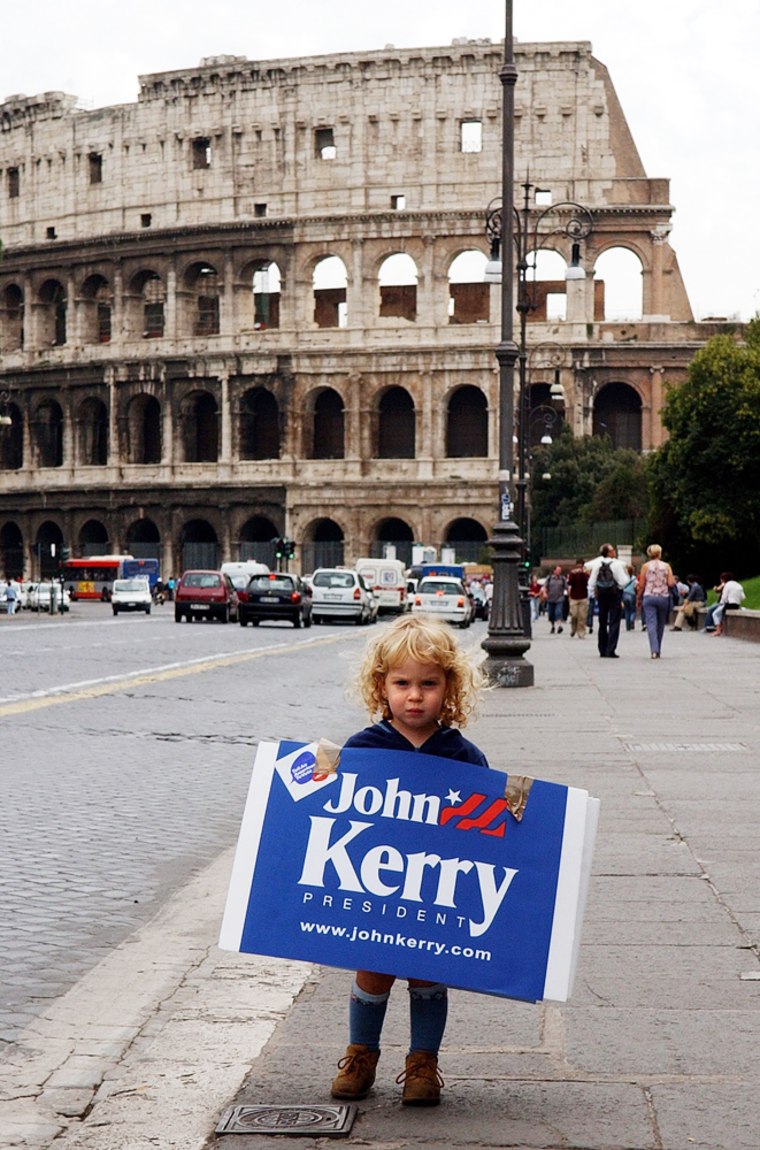Ken Childs is a pollster's nightmare. Originally from Seattle, he's registered to vote in New Hampshire. But this election Childs is casting a ballot in the Russian capital, where he and his family have lived for five years.
American Suki Smith, a London resident, has been abroad so long she nearly lost track of U.S. politics. This year, she's voting for the first time in more than two decades.
Gabriel Padilla, a 22-year-old university student from Washington, hasn't been overseas that long. But he's taking time out from his studies in Rome to vote.
It's mostly guesswork how hard-to-track American expatriates — some 4 million of them — will vote. They are far from the reach of snap phone polls and campaign advertisements.
But four years after a presidential election that was almost too close to call, Americans abroad are rushing to vote, knowing their absentee ballots could tip the scales in several battleground states on Nov. 2.
Embassies from Moscow to Mexico City say they are seeing unprecedented interest in the U.S. presidential election. Requests for ballots and information on last-minute voting procedures have tripled at some overseas missions.
"We're seeing a lot of traffic," said James Pettit, the U.S. consul-general in Moscow. "Compared to when I was here in 1992 (during the election that brought President Bill Clinton to the White House), there's greater interest this time around."
Political parties abroad
There's also greater focus by Republicans and Democrats overseas to get out the vote, after the 2000 election came down to a few hundred ballots in Florida.
"It's probably a based on a couple of things," said Colleen Graffy of the Republicans Abroad organization in Britain. "One is the intense split in this election, and the second is the knowledge of what happened in the last election, and that, clearly, every vote counts."

Before 2000, the overseas vote was viewed almost as an afterthought by political parties, a fact reflected by some states allowing absentee ballots to be filed up to 10 days after polls close. This year, both states and voters are making a more concerted effort to get votes in on time.
"You're talking about four or five or six percent of the electorate that is going to cast its ballots overseas. That's a lot. In a close election, every little thing matters," said Charlie Cook, a Washington DC-based independent pollster.
Divide among voters
Although information is largely anecdotal, embassy officials and political party organizers abroad say they are seeing many Americans voting abroad for the first time, like Suki Smith in London.
"I haven't voted in the 21 years that I've lived in England, and I've never felt the need to vote before. But right now I feel that President Bush has done a grave injustice to America and the American people, and I feel it's really important to vote," Smith said.
Political convictions are as deeply divided abroad as they are in the United States.
Padilla, the student in Rome, said he was voting for Bush "because I believe he is a strong leader, and I believe in his ethics and his values as a leader."
In the Egyptian capital Cairo, Jennifer and Erik Goodwin don't agree on the candidates. She's voting for Bush and he's voting for Democrat challenger John Kerry. But they do agree this is one of the most important U.S. elections ever.
"I voted in Colorado," Jennifer Goodwin said. "That's one of the swing states, so I assume my vote might matter."
Tallying the vote
Americans abroad, often on the other end of U.S. foreign policy, can sympathize with views held by citizens of their adopted countries. After the war in Iraq, opinion polls in Europe and the Middle East generally show a preference for Kerry among foreigners.
But it's not that easy to predict the overseas vote. Demand for absentee ballots tripled in Israel, where Americans typically vote Democrat. But this year they could endorse Bush, because he actively supports the government of Prime Minister Ariel Sharon and has spurned Palestinian leader Yasser Arafat.
That hasn't kept Democrats in Israel from rallying for Kerry, though. "There's a feeling that everything will go down the drain if we don't have a change of administration," said Joanne Yaron, vice-chair of the Democrats Abroad in Israel.
In Mexico, home of the largest group of Americans abroad — nearly 1 million — Diana Kerry, the candidate's sister, recently hit the campaign trial. Her message was targeted at Hispanic Americans in Mexico, and large retirement communities of Americans seeking sun and affordable property.
"John is addressing your issues in his campaign," Diana Kerry said.
Among the biggest issues, according to Republicans Abroad manager in Mexico City, Larry Rubin, is tax exemption for Americans living overseas and U.S. immigration policy.
State of confusion
After years abroad, there are plenty of Americans who don't vote — or just can't figure out how. The rules and deadlines vary widely from state to state, and thousands of ballots are expected to arrive late due to bureaucratic and logistical issues among county election boards.
"The most common complaint is that voting requirements and regulations are still a state and local prerogative," said Pettit, the U.S. consul-general. "And they do vary widely. Some jurisdictions allow ballots to be submitted by fax. That's a distinct minority, but it certainly makes it easier for people who wait until the last minute. Other jurisdictions require a much longer processing period."
As a last-minute measure, federal write-in ballots are being distributed by Republicans and Democrats overseas and by all U.S. embassies and consulates. But voters need a U.S. address to validate their ballot.
Ian Schier, who has worked in Moscow for 12 years, says he is at a loss over what to do.
"I have no residence in the United States, so the question is if you have to register in a state, which one do I register in? The state of confusion perhaps?"
